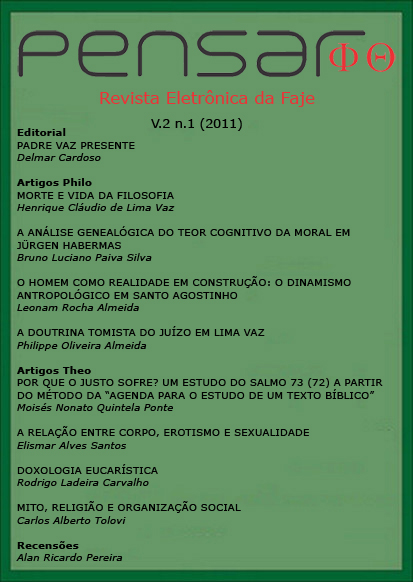POR QUE O JUSTO SOFRE? UM ESTUDO DO SALMO 73 (72) A PARTIR DO MÉTODO DA “AGENDA PARA O ESTUDO DE UM TEXTO BÍBLICO”
Palavras-chave:
sofrimento, justo/injusto, teodiceiaResumo
Este artigo tem duplo objetivo. Por um lado, pretendemos analisar o Salmo 73(72) acompanhando o itinerário de crise de fé do autor, que se depara com o sofrimento dos justos frente à prosperidade dos injustos. O salmista se pronuncia acerca de uma problemática que há séculos ecoa nas reflexões de judeus e cristãos, de um modo aguçado, realista e atual. Ele tem a coragem de refletir sobre um problema crucial para a fé sem fazer uso de soluções fáceis e sem a possibilidade de atenuar a dramaticidade da questão com a esperança de uma vida eterna. Por outro lado, almejamos fazer deste estudo um exemplo de aplicação da Agenda para o estudo de um texto bíblico, usada na FAJE, para quem dá seus primeiros passos no trabalho de exegese de uma perícope bíblica.
Abstract: This article has a double purpose. On one hand, we intend to analyze Psalm 73 (72), following the faith crisis itinerary of the author who is faced with the suffering of the Just in view of the prosperity of the unjust. The psalmist talks about an issue that has echoed for centuries in the reflections of Jews and Christians. He is sharp, realistic and contemporary. He has the courage to reflect on a faith”Ÿs crucial issue without easy solutions and without the possibility of mitigating the dramatic nature of the issue with the hope of eternal life. On the other hand, we wish to give an example of the Handbook for the study of a biblical text, used at FAJE, to the people who take their first steps in the labor of exegesis of a biblical pericope.





